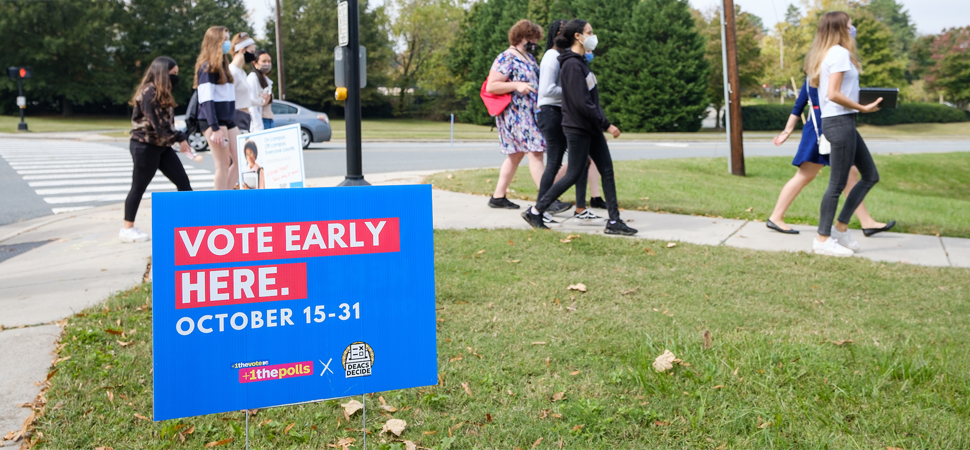Student voting skyrocketed at Wake Forest University, nationwide in 2020
With a student voting rate of 78.2% for 2020 Wake Forest outpaced the national average for voting engagement (66%), according to a recent study from the Institute for Democracy and Higher Education. WFU’s new voting rate also marks a 29.9% increase from 2016, highlighting the university’s commitment to encouraging increased civic action. The full campus report can be viewed online.
The report also found that 91.5% of WFU’s student body is registered to vote and 85.6% of those registered voters participated in the 2020 election. Nationally, about 80% of registered students voted in 2020.
“Wake Forest has been committed to improving voter turnout on campus for the past several years, so to see that we were able to galvanize so many students to participate in the 2020 election is exciting,” said Marianne Magjuka, Ed.D., Assistant Dean of Students and Executive Director of the Office of Civic & Community Engagement.
“Our students overcame several barriers last year as they continued their education in the midst of a pandemic and navigated through a pivotal election,” explained Magjuka. “I am so proud of our campus community. They understood their responsibility as citizens to vote, and saw how important it was to cast their ballot.”
Leading up to the 2020 election – Deacs Decide, a highly collaborative campus-wide political engagement project – engaged in several voter registration and education efforts to encourage students to participate in the election process. Including establishing an early voting site within walking distance to the Reynolda campus, social media and email campaigns, voter registration drives, debate watch parties, and March to the Polls – an initiative that walked students to the polls during each day of the early voting period in North Carolina.
“Since the program first began in 2012, Deacs Decide has played a pivotal role on campus for voter engagement, and it’s reflected in this most recent data,” explained Magjuka. “By collaborating with faculty, staff, students, and various departments on campus we were able to reach large swaths of students, increasing voter participation on campus for the 2020 election.”
In addition to participating in this report, Wake Forest joined several other national voter education and registration challenges as a way to boost student civic engagement on campus.
Each aligned to the ALL IN Campus Democracy Challenge, a national, nonpartisan program supporting and recognizing colleges and universities for their commitment to helping students form the habits of active and informed citizenship and making democratic participation a core value on their campuses.
In 2021, Wake Forest was designated a voter-friendly campus by NASPA, Student Affairs Administrators in Higher Education, because of its initiatives to register and encourage students to vote. Washington Monthly magazine also named WFU among America’s Best Colleges for Student Voting for two consecutive years, in 2020 and 2021, respectively
Nationwide, the study’s authors reported a record-breaking set of findings.
The Wake Forest University data comes from the Institute for Democracy & Higher Education (IDHE), creators of the National Study of Learning, Voting, and Engagement, or NSLVE. IDHE is located at Tufts University’s Tisch College of Civic Life.
On campuses across the country, students built on the momentum swing of 2018 and voted at high rates in the 2020 election, with voter turnout jumping to 66% in last year’s presidential election. The 14 percentage point increase, from 52% turnout in the 2016 election, outpaces that of all Americans, which jumped 6 percentage points from 61% to 67%, according to the U.S. Census Bureau.
“That students, often younger and first-time voters, turned out at rates commensurate with the general public is nothing short of stunning,” said IDHE Director Nancy Thomas. “We attribute this high level of participation to many factors, including student activism on issues such as racial injustice, global climate change and voter suppression, as well as increased efforts by educators to reach students and connect them to the issues and to voting resources.”
The dataset reflects all 50 states and the District of Columbia and includes 49 of the nation’s 50 flagship schools. IDHE uses de-identified student records to ensure student privacy. The 2020 dataset is robust with 8,880,700 voting-eligible students representing 1,051 colleges and universities.

